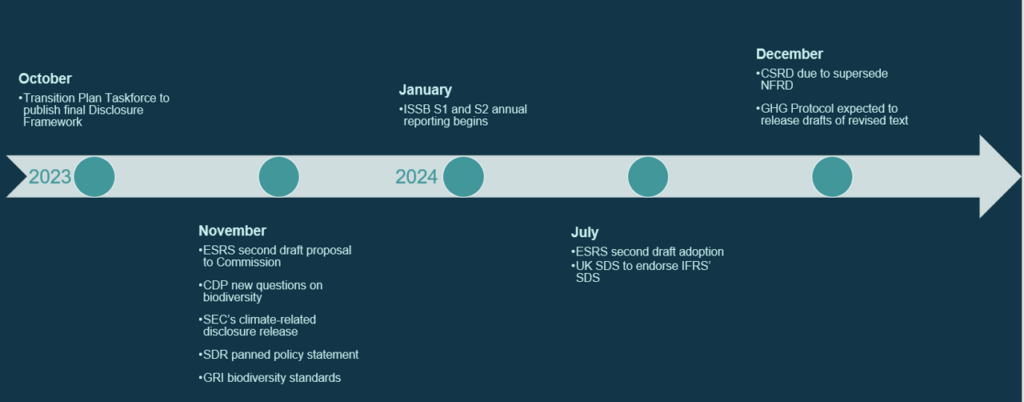ESG Policies and Regulations Update September 2023

The following document details framework updates that occurred in September, as well as highlighting some key updates and releases to be aware of in the coming few years. Frameworks such as those explored in this report can help stakeholders understand how an organisation manages risks and opportunities around such sustainability issues. Often used as a communication tool, it can play an important role in demonstrating the sincerity of a company’s actions as well as ensuring good governance.
The global regulatory landscape has experienced exponential growth in the past few decades, with 647% increase in ESG regulations since the start of the 21st century. In June, global ESG regulations were found to have increased by 155% in the last 10 years. 1,255 ESG regulations have been introduced worldwide since 2011 yet to compare, only 493 regulations were published in the 9 years from 2001 to 2010.
September 2023 Update
The general observed trends within frameworks include a growing focus on disclosure, regarding both data and strategy, as well as an increased engagement of supply chains. Climate impacts are also seeing greater levels of inclusion into regulations and policies.
| Framework | Update | Date |
|---|---|---|
| GRI | EFRAG and GRI have confirmed that they have achieved a high level of interoperability between their respective standards in relation to impact reporting. | 5 Sept 2023 |
| SBTi | The SBTi is set to split its standard-setting and target validation functions as part of a major ‘transformation’ plan is intended to increase its capacity. | 13 Sept 2023 |
| TNFD | The TNFD has published its finalised set of recommendations, being 14 recommended disclosures and additional implementation guidance have been unveiled. | 18 September 2023 |
UN unveils Plastic Treaty
The UN Environment Programme has published the first draft of a new global treaty intended to boost efforts to eliminate plastic production through to 2024. The draft states nations should aim for “prevention, progressive reduction and elimination of plastic production throughout the lifecycle of plastic”.
G20 Nations Agree to Treble Renewable Energy Capacity
The G20 summit in India was concluded with mixed environmental progress. Strong progress was made on clean energy, with leaders agreeing to triple renewable generation capacity by 2030. However, the weak wording on reducing fossil fuels and energy efficiency has caused concerns. Other groups such as CDP have criticised the absence of nature in discussions and are urging members to adopt 10 principles for high-quality mandatory disclosure on nature.
SDGs Can Be Delivered Following a Five-Point Plan, yet Expected to Take 20 Years
Earth4All and the Foundation for European Progressive Studies (FEPS) has unveiled a five-point plan to deliver the UN’s Sustainable Development Goals (SDGs), but this will take more than 20 years until completion.
Upcoming Changes

| Date Expected | Framework | Description |
|---|---|---|
| Mid-late 2023 | SDR | Planned policy statement confirming SDR rules |
| Mid-late 2023 | GRI | New GRI Biodiversity Standards expected to be published |
| Mid-late 2023 | SEC’s climate-related disclosures | Issuance of a finalised Climate Disclosure rule delayed until ‘fall’ |
| October 2023 | Transition Plan Taskforce | Final Disclosure Frameworks expected for the seven selected sectors guidance |
| November 2023 | CSRD | EFRAG to propose a second draft of ESRS to the Commission that will include standards for sectors, non-EU companies, and listed SMEs; voluntary guidance for non-listed SMEs; amendment to the first draft to implement a cap on value chain emissions |
| 2023 | CDP | New questions to be released on biodiversity, requesting Board level oversight, public commitments, the impact of the value chain, actions to progress the topic, indicators and related publications |
| July 2024 | CSRD | Anticipated adoption of the second draft of ESRS |
| July 2024 | UK SDS | Secretary of State for Business and Trade will consider the endorsement of the IFRS Sustainability Disclosure Standards, to create the UK SDS |
| 2024 | CSRD | Due to supersede NFRD in 2024. Large companies already subject to NFRD must begin reporting on the fiscal year 2024. |
| 2024 | GHG Protocol | Expected to release drafts of revised text |
| 2025 | GHG Protocol | Final standards and guidance to be released |
Implications
Looking ahead, alignment of regulatory initiatives, harmonisation of targets and more standardised data will be needed to help improve transparency and enable companies to achieve their decarbonisation targets. The underlying principles new regulations and ratings due to align to are the ESRS and ISSB.
As a result, companies should be reviewing and aligning to the ISSB’s Standards and the ESRS. Initially, a gap analysis should be conducted to identify missing data and information as well as giving an opportunity to make roles and responsibilities clear to all personnel involved – upskilling may be required. Ensuing this, improving the accuracy of data should occur, accompanied by an internal report in preparation for public reporting once UK compliance requirements have been released.
How we can help
We can support you and your organisation navigate the complexities of voluntary and mandatory reporting, as well as the regulatory frameworks around sustainability. Please contact us to speak to one of our experts.
Abbreviations
CDP – (formally) Carbon Disclosure Project
CSRD – Corporate Sustainability Reporting Directive
ESRS – European Sustainability Reporting Standards
GHG Protocol – Greenhouse Gas Protocol
GRI – Global Reporting Initiative
ISSB – International Sustainability Standards Board
SBTi – Science Based Targets Initiative
SDR – Sustainability Disclosure Requirements
TNFD – Taskforce for Nature Related Disclosure
UK SDS – Sustainability Disclosure Standards



